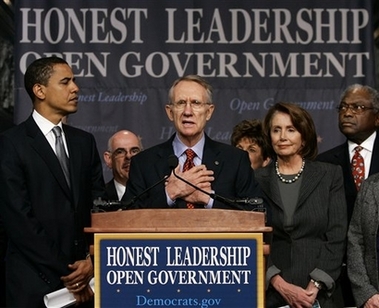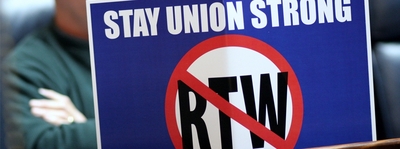Meet Big Labor's New Enemy -- Their Own Members
Deep in the heart of big labor country, Crain's Chicago Business reports of the battle going on between big labor and their members. With help from the National Right to Work Legal Defense Foundation, these union members have found support in exercising their rights:
Multinational corporations have a new ally in their battles with organized labor: unionized workers.
As organized labor loses leverage in a race-to-the-bottom global market, some workers are becoming so disillusioned by what their unions can, or rather can't, do for them that they want out. The disaffected include dozens of machinists at Caterpillar Inc.'s plant in Joliet who crossed the picket line during a strike last summer and are planning unfair labor practices complaints against the union.
Organized labor's slippage is most acute in the manufacturing sector, which has lost 4.7 million jobs and seen membership shrink by almost a third since 2001, according to the Bureau of Labor Statistics. Overall, private-sector union membership stands at just 6.9 percent nationally and 10.6 percent in Illinois.
“Unions lack sufficient power to get their way,” says Mike Zimmer, a law professor at Loyola University Chicago. “It is a period of concession bargaining.”
Many rank-and-file employees have opposed unions all along, of course. Despite organizing drives, workers have turned down collective bargaining at automobile plants across the South. Legislatures in 23 states have enacted “right-to-work” laws that allow employees to opt out of dues-paying membership at union shops; Indiana joined this camp early this year.
Now some workers in union-friendly states are turning on their brethren over strikes.
In Kansas City, Mo., a Honeywell Inc. employee filed charges with the National Labor Relations Board this year against an International Association of Machinists local for imposing a $7,361.36 fine for working during a strike, according to the National Right to Work Legal Defense Foundation, an organization backed by businesspeople and individuals who oppose labor contracts mandating membership. In Los Angeles, three employees at a Boeing Co. plant brought complaints against the United Auto Workers in 2010 after it tried to discipline them for refusing to give up their jobs during a strike. The three claimed to have resigned from the union before the walkout.
Similar charges have been filed and settled in Illinois, Wisconsin, Ohio, New Jersey and Connecticut, with unions including the International Brotherhood of Teamsters and the United Steelworkers of America named in complaints.
In Illinois, the latest intra-union conflict—and potentially the biggest yet—is in Joliet. Last May, after contract negotiations stalled, nearly 800 IAM-represented employees walked off the job at Caterpillar's hydraulic-parts factory. After a few weeks, more than 100 returned to work, fed up over the lack of progress in the talks and pinched by the union's $150-a-week strike pay, some workers say.





